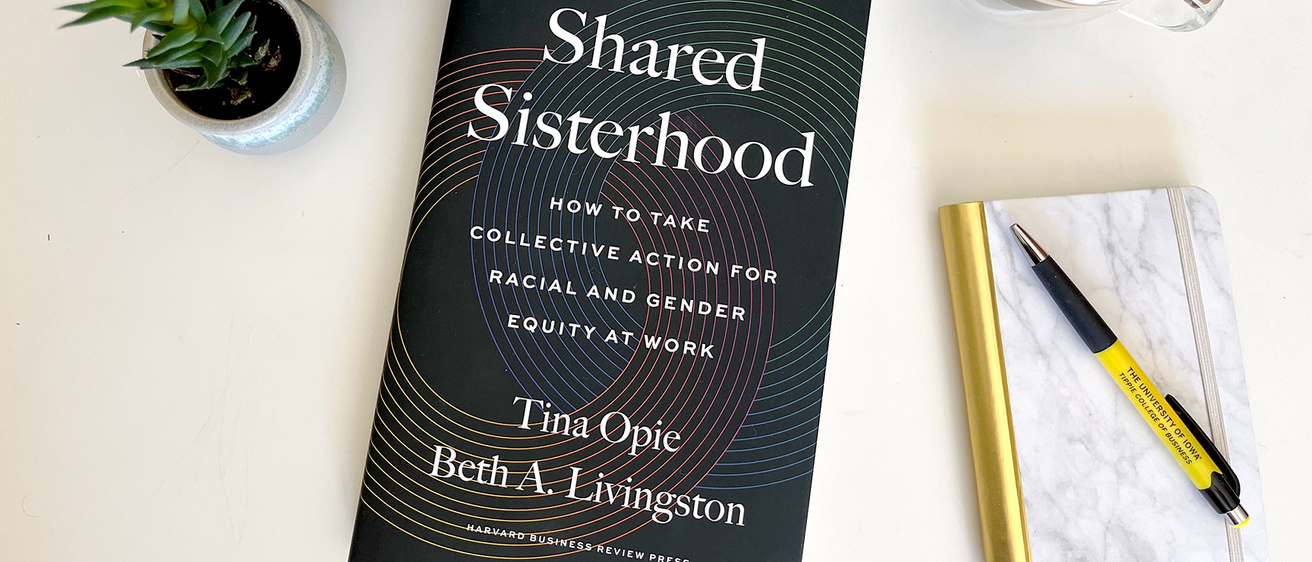Beth Livingston grew up in a relatively white neighborhood in Louisville, Ky., but her house was often filled with young Black men—schoolmates and friends of her older brothers who stopped by to hang out. Many became her friends, too.
“They became like brothers to me as much as my own brothers, and they still call me their little sister,” said Livingston, now assistant professor of management & entrepreneurship in the Tippie College of Business. “Because I was a small child, I had no idea why they were at my house. All I knew was they loved me and laughed with me and protected me and they were like my brothers.”

As she got older, she learned the reason why they were at her house—Louisville still had mandatory school busing when she grew up, an attempt to ameliorate Kentucky’s legacy of slavery and segregation, and those young men lived in Black neighborhoods on the other end of town. Often with no easy way to get home on a timely basis, her family invited them to stay in theirs overnight.
Livingston said those experiences were powerful moments in her young life that let her see two opposites as both being true—that Black people and white people were not much different, and yet they were. Race didn’t matter because these young men had so many of the same thoughts, hopes, and concerns as she did. But it did matter because, well, for starters, they were going to school in a strange neighborhood on the other side of town.
“I did not understand the ramifications of race, gender, and power at that time, but it gave me a head start on understanding power in America and allowed me to see it through a different lens,” she said. “That made me want to learn how to deconstruct this paradigm once I went to college.”
Today, Livingston’s research focuses on the impact that power has on people, especially those who have little of it. She’s decided to use her own power she has as a white person to help others understand that impact and help create a more equitable world. As a business professor, she said it makes sense that she focuses on the business world because that’s what she understands.
It's also why she wrote a book about it.
“Shared Sisterhood: How to Take Collective Action for Racial and Gender Equity at Work” offers a plan for white, Black, and Latina women to come together to build cross-racial alliances and take collective action to change the business structures that hold women back.
“We didn’t want to passively wait for other people to offer solutions anymore. We wanted to find a solution ourselves,” said Livingston, who co-authored the book with Tina Opie, associate professor of management at Babson College in Wellesley, Mass.
Livingston said that to create systemic change, Black, white, and Latina women must build their own alliances through vulnerability, trust, risk-taking, and empathy. Without building bridges to each other and acknowledging their own racial blind spots, she said, women won’t have the kind of trusting, authentic connections they need while working together to make systemic change.
She says many authors have already convincingly identified the gender and racial biases that persist in American businesses and the larger society. Businesses have responded with scattershot efforts at equity programs while women have attempted to “lean in” and assimilate into the culture.
But leaning in hasn’t worked and too many of those corporate diversity programs are well-intentioned failures or just window dressing. So Livingston said it’s time to change business culture. “Shared Sisterhood” lays out a plan that employees and organizational leaders can actually use, offering dozens of practical tips that women can take to first bridge the gaps between them and how they can use their power to change their workplace. Each chapter concludes with questions for personal reflection or to guide a group discussion that can help overcome roadblocks.
Livingston said they don’t expect to win everyone over with their ideas. Many people are simply uncomfortable talking about power imbalances, especially those caused by race and gender. Others will actively resist change. But she said even a small percentage of an organization’s employees are enough of a coalition to pressure an organizational structure to change.
“We wrote this book to be hopeful and optimistic that we can make things better for everyone,” she said. “It’s not a gloom and doom book and it doesn’t make anyone feel guilty. If we didn’t believe we could provide a solution to the problem, we wouldn’t have written it.”
“Shared Sisterhood” was published in October by Harvard Business Review Press.
MEDIA CONTACT: Tom Snee, 319-384-0010 (o); 319-541-8434 (c); tom-snee@uiowa.edu
